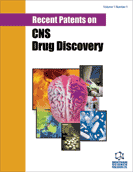Abstract
In the last decade, current opinion for Parkinson disease (PD) etiology has swung from the hypothesis of a toxic/environmental disorder to understanding it as a highly heritable condition. Recent research conducted in families affected from PD has disclosed 6 genes that codify for proteins in pathways of neurodegeneration in PD. This review focuses in new drugs aimed to prevent the apparition and progression of the disease developed after the knowledge obtained from the genetic studies of PD, covering most recent and important patents.
Keywords: Synuclein, parkin, LRRK2, proteasome
Recent Patents on CNS Drug Discovery (Discontinued)
Title: Translating Genetic Findings into Therapy in Parkinson Disease
Volume: 2 Issue: 3
Author(s): Sagrario M. Palomo and Adriano Jimenez-Escrig
Affiliation:
Keywords: Synuclein, parkin, LRRK2, proteasome
Abstract: In the last decade, current opinion for Parkinson disease (PD) etiology has swung from the hypothesis of a toxic/environmental disorder to understanding it as a highly heritable condition. Recent research conducted in families affected from PD has disclosed 6 genes that codify for proteins in pathways of neurodegeneration in PD. This review focuses in new drugs aimed to prevent the apparition and progression of the disease developed after the knowledge obtained from the genetic studies of PD, covering most recent and important patents.
Export Options
About this article
Cite this article as:
Palomo M. Sagrario and Jimenez-Escrig Adriano, Translating Genetic Findings into Therapy in Parkinson Disease, Recent Patents on CNS Drug Discovery (Discontinued) 2007; 2 (3) . https://dx.doi.org/10.2174/157488907782411747
| DOI https://dx.doi.org/10.2174/157488907782411747 |
Print ISSN 1574-8898 |
| Publisher Name Bentham Science Publisher |
Online ISSN 2212-3954 |
 1
1Related Articles
-
Immunotherapy in a Natural Model of Aβ Pathogenesis: The Aging Beagle
CNS & Neurological Disorders - Drug Targets Innate Immune Surveillance in the Central Nervous System Following Legionella pneumophila Infection
CNS & Neurological Disorders - Drug Targets Organotypic Cultures as Tool to Test Long-Term Effects of Chemicals on the Nervous System
Current Medicinal Chemistry Tauopathies – Focus on Changes at the Neurovascular Unit
Current Alzheimer Research Structure-Function Relationships of Phytochemicals in Control of Mosquito Vectors
Current Organic Chemistry A Review of Recent Patents on the ASICs as a Key Drug Target
Recent Patents on Biotechnology Multimodality Imaging in Acute Ischemic Stroke
Current Medical Imaging Can the Written Word Fuel Pharmaceutical Innovation? Part 1. An Emerging Vista from von Economo to COVID-19
Combinatorial Chemistry & High Throughput Screening Adenosine Metabolism in Toxoplasma gondii: Potential Targets for Chemotherapy
Current Pharmaceutical Design Cellular Delivery In Vivo of siRNA-Based Therapeutics
Current Pharmaceutical Design Angiopoietin-1 and C16 Peptide Attenuate Vascular and Inflammatory Responses in Experimental Allergic Encephalomyelitis
CNS & Neurological Disorders - Drug Targets Rationale of Hyperbaric Oxygenation in Cerebral Vascular Insult
Current Vascular Pharmacology Sex Steroids in Autoimmune Diseases
Current Topics in Medicinal Chemistry Novel Targets for the Development of Anti-Herpes Compounds
Infectious Disorders - Drug Targets Non-Celiac Gluten Sensitivity Triggers Gut Dysbiosis, Neuroinflammation, Gut-Brain Axis Dysfunction, and Vulnerability for Dementia
CNS & Neurological Disorders - Drug Targets CXCL8 as a Potential Therapeutic Target for HIV-Associated Neurocognitive Disorders
Current Drug Targets PFGE: Importance in Food Quality
Recent Patents on Food, Nutrition & Agriculture New Strategies for Immune-Mediated Anti-Viral Drug and Vaccine Development
Current Pharmaceutical Design HIV-1-Associated Dementia During HAART Therapy
Recent Patents on CNS Drug Discovery (Discontinued) A Systematic Approach to Hypertensive Urgencies and Emergencies
Current Hypertension Reviews






















